Abstract
Pentoxifylline (PTX), a drug that improves neutrophil function in vitro, has been shown to protect neonatal mice against death from experimental staphylococcal infection in vivo at a dose of 50 mg/kg. Using a total of 774 neonatal mice, the effects of various doses of PTX were examined and compared with the effects of three analogs: HWA-448, HWA-285, and A81-3138. A subcutaneous abscess was induced with 10(8) Staphylococcus aureus, and drug or saline was given daily subcutaneously from 2 days before to 4 days after infection. Noninfected animals (given saline without S. aureus) had 0% mortality (0 of 66), and infected animals without drug (given saline) had a mortality of 70% (161 of 231). PTX and HWA-448 showed the greatest protection among the drugs tested at 15 mg/kg with mortality rates of 27 and 38%, respectively (Kaplan-Meier method, P = 0.0001 and 0.0004, respectively). HWA-285 was most protective at 25 mg/kg (mortality, 45%; P = 0.0046) and A81-3138 was most protective in animals at 15 mg/kg (mortality, 42%; P = 0.0045). PTX, HWA-448, HWA-285, and A81-3138 at doses of 200, 100, 100, and 50 to 75 mg/kg, respectively, were toxic as shown by worsened weight loss and increased mortality in animals when compared with infected animals without drug. PTX and its analogs decrease mortality from experimental infections at lower doses but are toxic at higher doses. Pharmacokinetic characteristics of the drugs were similar except that HWA-285 produced lower concentrations in serum and A81-3138 showed a dose-dependent kinetics (longer half-life at a higher dose).
Full text
PDF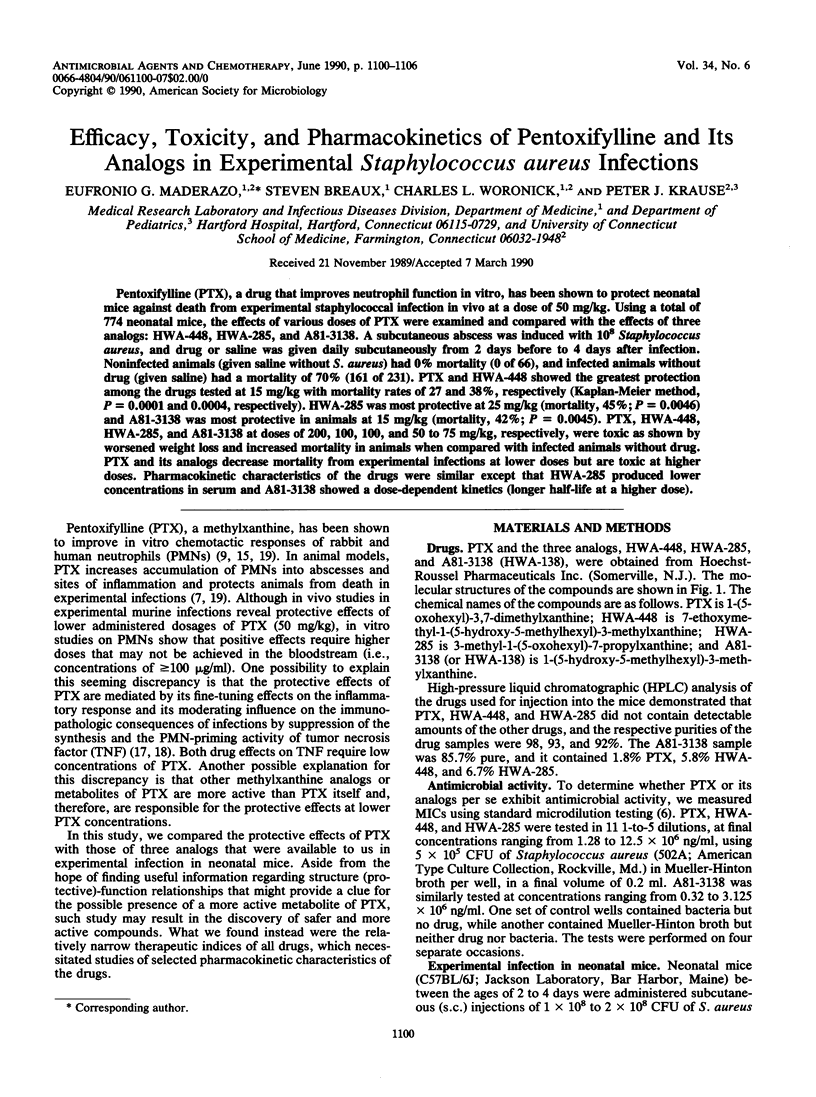
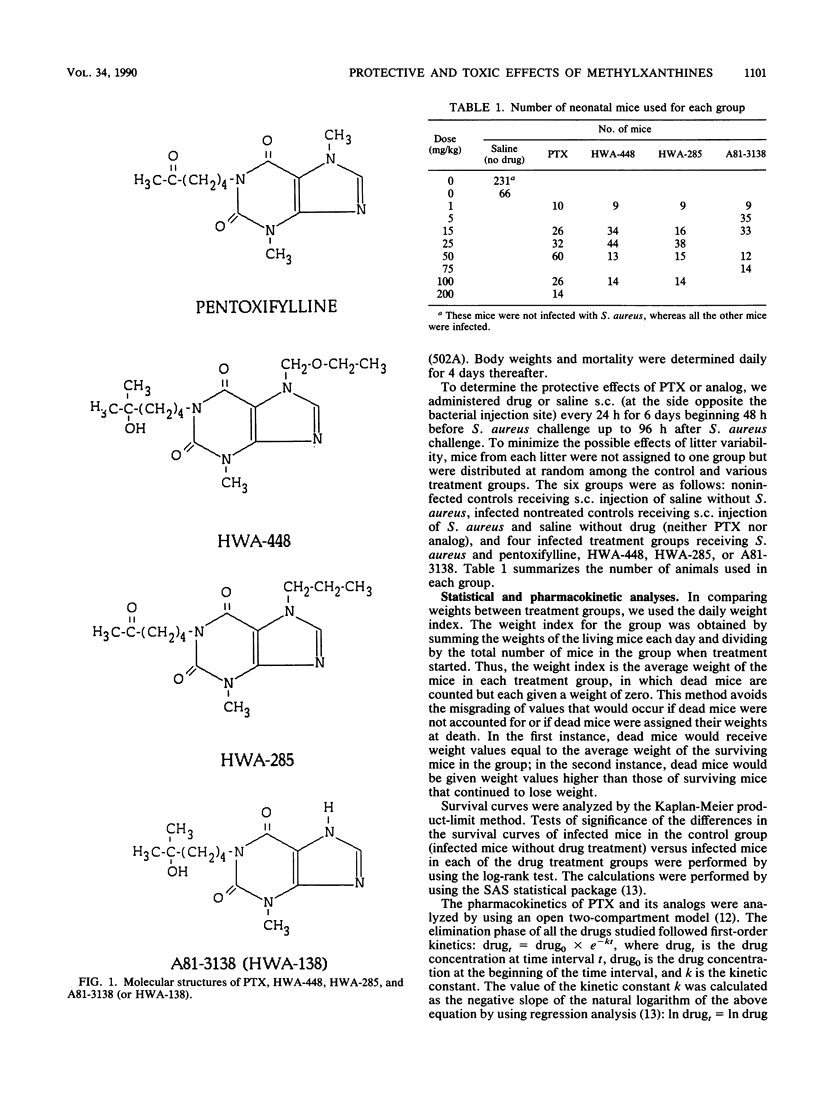
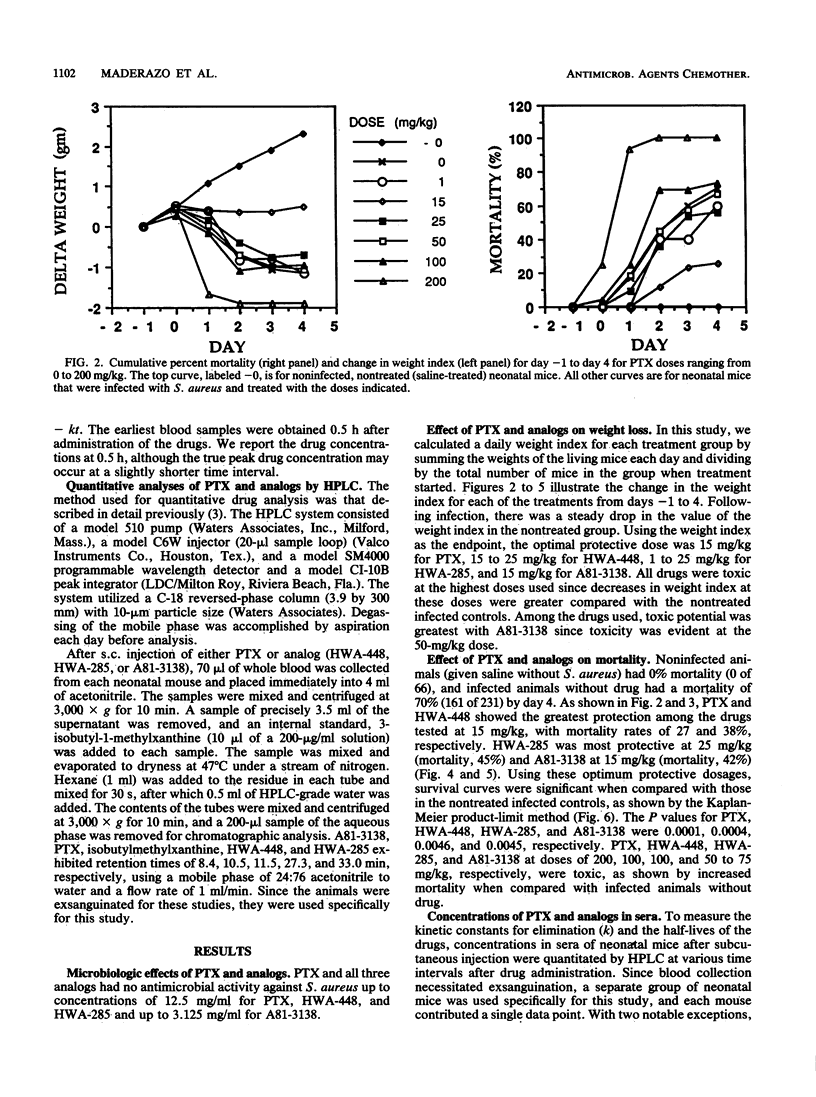
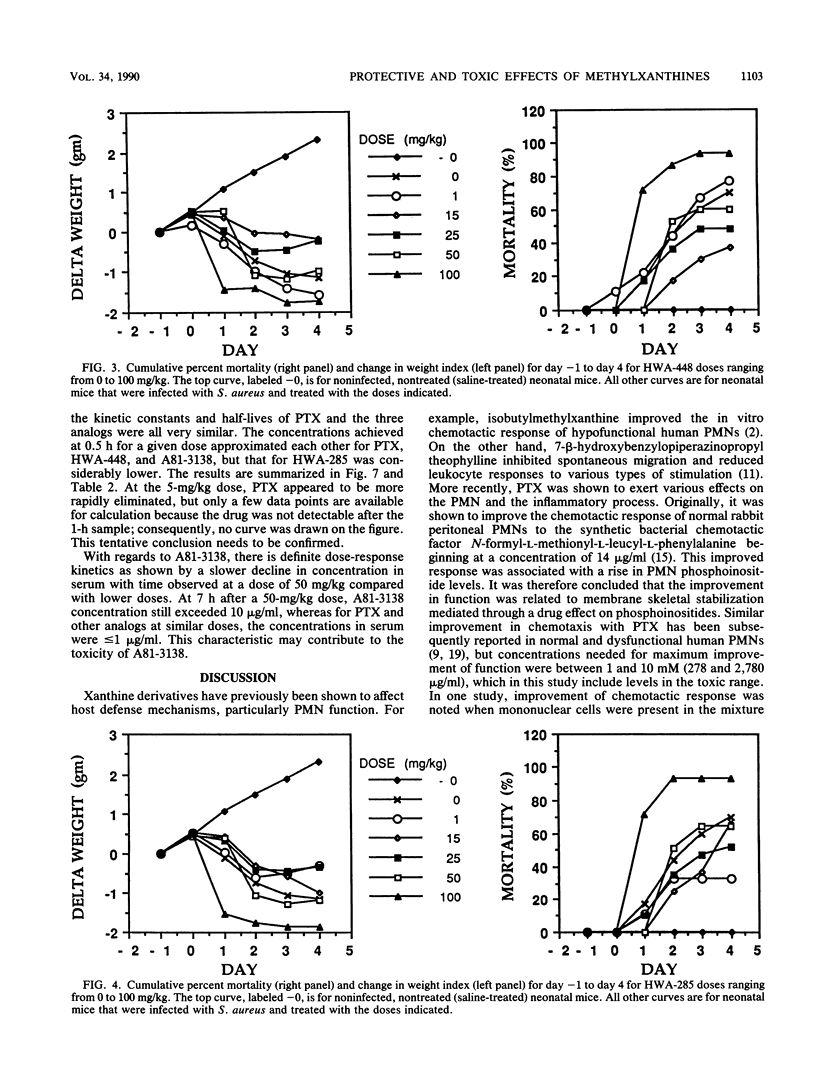
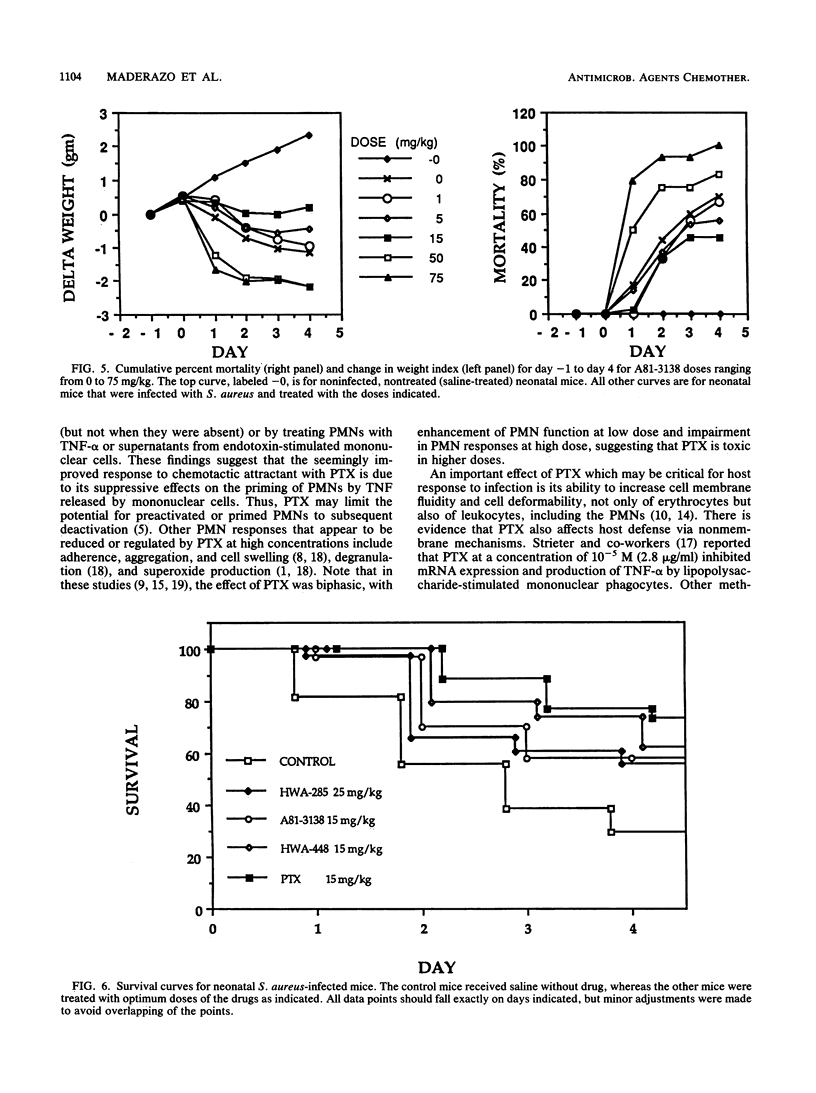
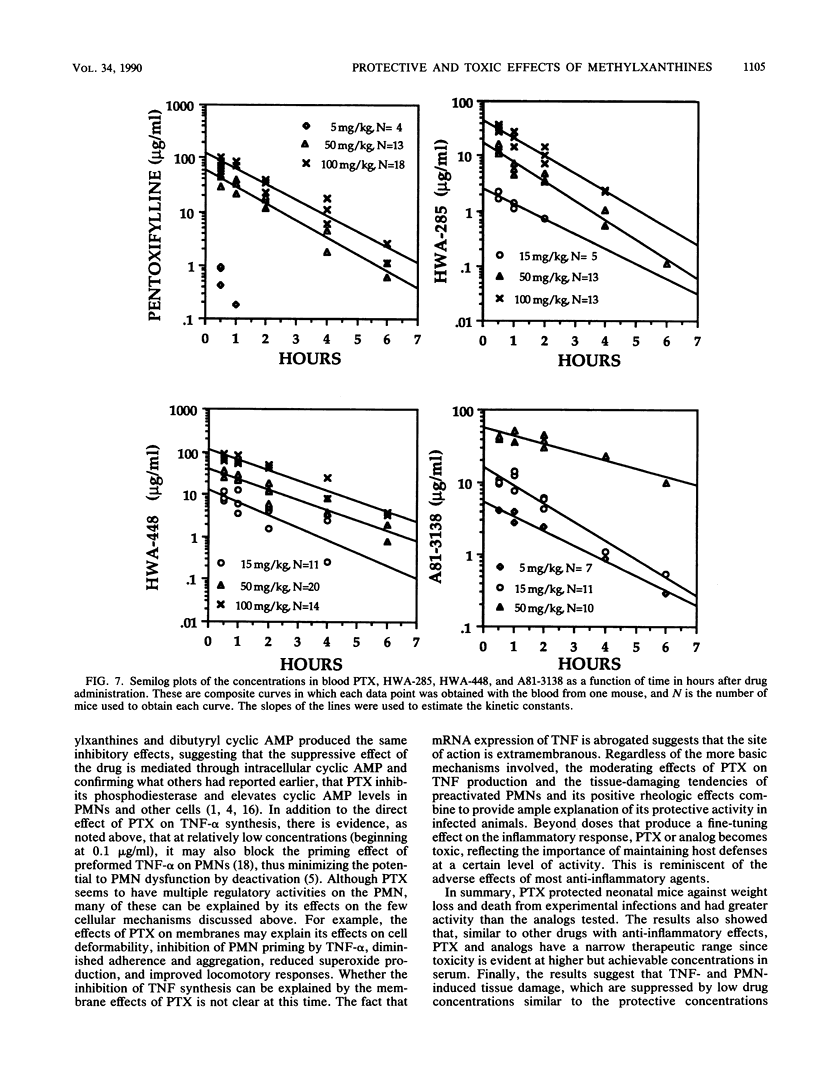
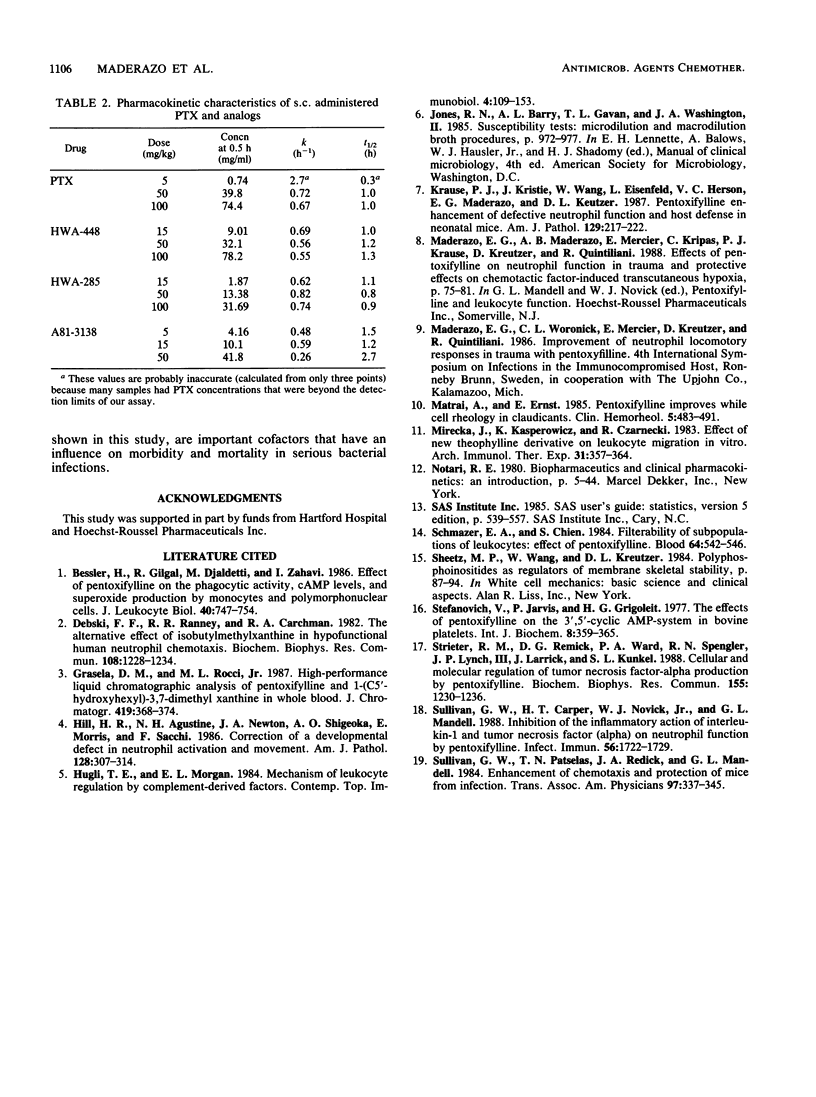
Selected References
These references are in PubMed. This may not be the complete list of references from this article.
- Bessler H., Gilgal R., Djaldetti M., Zahavi I. Effect of pentoxifylline on the phagocytic activity, cAMP levels, and superoxide anion production by monocytes and polymorphonuclear cells. J Leukoc Biol. 1986 Dec;40(6):747–754. doi: 10.1002/jlb.40.6.747. [DOI] [PubMed] [Google Scholar]
- Debski B. F., Ranney R. R., Carchman R. A. The alterative effect of isobutylmethylxanthine in hypofunctional human neutrophil chemotaxis. Biochem Biophys Res Commun. 1982 Oct 15;108(3):1228–1234. doi: 10.1016/0006-291x(82)92131-3. [DOI] [PubMed] [Google Scholar]
- Grasela D. M., Rocci M. L., Jr High-performance liquid chromatographic analysis of pentoxifylline and 1-(5'-hydroxyhexyl)-3,7-dimethylxanthine in whole blood. J Chromatogr. 1987 Aug 7;419:368–374. doi: 10.1016/0378-4347(87)80302-x. [DOI] [PubMed] [Google Scholar]
- Hill H. R., Augustine N. H., Newton J. A., Shigeoka A. O., Morris E., Sacchi F. Correction of a developmental defect in neutrophil activation and movement. Am J Pathol. 1987 Aug;128(2):307–314. [PMC free article] [PubMed] [Google Scholar]
- Hugli T. E., Morgan E. L. Mechanisms of leukocyte regulation by complement-derived factors. Contemp Top Immunobiol. 1984;14:109–153. doi: 10.1007/978-1-4757-4862-8_4. [DOI] [PubMed] [Google Scholar]
- Krause P. J., Kristie J., Wang W. P., Eisenfeld L., Herson V. C., Maderazo E. G., Jozaki K., Kreutzer D. L. Pentoxifylline enhancement of defective neutrophil function and host defense in neonatal mice. Am J Pathol. 1987 Nov;129(2):217–222. [PMC free article] [PubMed] [Google Scholar]
- Mirecka J., Kasperowicz K., Czarnecki R. Effect of the new theophylline derivative on leukocytes migration in vitro. Arch Immunol Ther Exp (Warsz) 1983;31(3):357–364. [PubMed] [Google Scholar]
- Schmalzer E. A., Chien S. Filterability of subpopulations of leukocytes: effect of pentoxifylline. Blood. 1984 Aug;64(2):542–546. [PubMed] [Google Scholar]
- Sheetz M. P., Wang W. P., Kreutzer D. L. Polyphosphoinositides as regulators of membrane skeletal stability. Kroc Found Ser. 1984;16:87–94. [PubMed] [Google Scholar]
- Strieter R. M., Remick D. G., Ward P. A., Spengler R. N., Lynch J. P., 3rd, Larrick J., Kunkel S. L. Cellular and molecular regulation of tumor necrosis factor-alpha production by pentoxifylline. Biochem Biophys Res Commun. 1988 Sep 30;155(3):1230–1236. doi: 10.1016/s0006-291x(88)81271-3. [DOI] [PubMed] [Google Scholar]
- Sullivan G. W., Carper H. T., Novick W. J., Jr, Mandell G. L. Inhibition of the inflammatory action of interleukin-1 and tumor necrosis factor (alpha) on neutrophil function by pentoxifylline. Infect Immun. 1988 Jul;56(7):1722–1729. doi: 10.1128/iai.56.7.1722-1729.1988. [DOI] [PMC free article] [PubMed] [Google Scholar]
- Sullivan G. W., Patselas T. N., Redick J. A., Mandell G. L. Enhancement of chemotaxis and protection of mice from infection. Trans Assoc Am Physicians. 1984;97:337–345. [PubMed] [Google Scholar]


